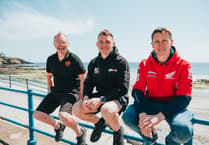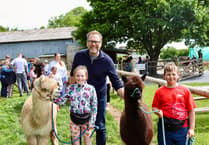Some might say it’s a bad idea to meet your hero, but I can safely say this does not apply to Sir Michael Morpurgo.
As a child I had devoured many of Michael’s books and so I was especially excited, if not a little nervous, when he agreed to speak to me. What do you ask a favourite childhood author first, and what if he does not live up to your expectations?
I need not have worried. We got chatting quickly and he proved himself to be a gentle, thoughtful and intelligent man with a great love of nature and the environment, which has had a huge influence on his writing.
Many of Michael’s previous works have featured animals as protagonists or other important characters, such as the horse Joey in War Horse, the lion cub in The Butterfly Lion and a greyhound called Best Mate in Born to Run.
’My writing, much of it is connected with how we, and children in particular, relate to animals.
’I’m interested in the animals of course, but I’m more interested in the relationship between us and them, how much we love being close to them but also how poorly they are treated and exploited sometimes, if you like the good and the bad and the ugly of it all.
’But finally how we are today. We’re living on a planet that we discovered during my lifetime is very fragile and we’ve done terrible things to it. It’s coming back to haunt us. We know it’s got to stop,’ he said to me.
With petrol prices rising, COP26 been and gone and ever higher temperatures in the Arctic, more and more people are determined to attempt to reverse the damage the human race has done to the Earth.
Since the pandemic, we’ve almost rediscovered nature, enjoying our gardens when we were stuck at home or walking the dog across traffic-free countryside.
It is both unsurprising and appropriate then that Michael’s new stories focus on the natural world.
While many of us were furloughed, made redundant or working from home during the past two years, very little changed for Michael. Instead, he told me, it may have been one of the most productive times in his life.
’That’s the interesting thing about a lockdown. For writers it’s not that different because you’re at home and you are by and large alone in your room and you’ve got to get on doing this and that in a lockdown and it was so before lockdown,’ he said.
Over the past two years, Michael has been busy beavering away on two new creations which came out earlier this year. When Fishes Flew is narrated by a flying fish and tells the story of a young girl searching for her great-aunt while A Song of Gladness, which is aimed at younger children, describes the interconnection of all living things, and was inspired by a blackbird in Michael’s garden.
He said: ’I noticed a blackbird singing when I was in my garden one morning [during lockdown] and I sang back and we had a conversation.
’I just imagined the song that he was singing going around the world. It’s just a blackbird singing and suddenly it wasn’t just a blackbird singing.
’We hadn’t spoken to anyone really for three or four weeks.’
Perhaps unsurprisingly, Michael has had pets in his home throughout his life, and until recently, was a long-term dog owner.
’All my life, I’ve had pets. But now I think we’ve got to an age where it’s quite difficult because we move around a lot. I travel a lot.
’We still had dogs until about 12 or 15 years ago and then after they died we decided, sadly, that it was better not to get another because we’re getting in cars too much and travelling around the place.
’We have now reduced ourselves down to four goldfish. If we have such things as pets it’s the animals I see when I go for a walk in the fields. Those are my pets today, the wild pets if you like,’ said Michael.
Michael’s love of nature shines through in his charitable work too. Michael and his wife Clare founded the charity Farms for City Children at Iddesleigh in 1976 to give children living in cities the chance to spend time outdoors in the countryside.
He said: ’I think there’s been 100,000 children that have come to our three farms. All of them spent a week in the countryside, working with farmers, finding out where their food comes from and all that sort of thing.
’But as they’re doing it, they’re looking around for the first time in their lives and they’re seeing the beauty of it and the birds in the air, the fish in the river, the flowers and the growing of their food, the digging up of potatoes.
’It’s what cities and the supermarkets cut you off from if you’re not careful, and so that’s what you lose.
’I’m very conscious of the fact that the stories that I write are about the history of the people who live down here. And what’s really lovely is that you realise it’s stories like this that spread around the world being translated and so you get people in China and Japan and Australia and France reading stories set in Devon. And I love the fact that when I go to these places I can talk about where I live.’
But Sir Michael, who became the third Children’s Laureate from 2003 to 2005, is certainly not a boastful man neither about where he lives nor his literary achievements.
Last week, Michael was awarded the Chen Bochui award in China for his contribution to children’s literature, a particularly special award since its usually only given to Chinese writers.
’It’s wonderful,’ he said. ’It’s awarded in China to a writer who’s made a significant contribution to children and literature throughout the world, and so it’s a wonderful thing to be awarded. It’s very rare for a foreign writer to get it, it doesn’t really happen that much so I was pretty honoured when they told me last week.
’It’s nice to win prizes here too, but if you win a prize thousands of miles away, what you know is that there are kids in China, South Korea and Japan and they’re reading novels. They’re finding out how it is to be here in Devon.’
Yet, despite how touched he seemed, I sensed he would never have mentioned it had I not asked first.
Of course, I did also ask Michael some less profound questions.
What did he do for Christmas? He spent it alone with his wife, a sensible move considering the rising number of omicron covid cases.
What was his favourite book to write? His most recent book, When Fishes Flew, which he reckons may be the only children’s book told by a fish.
And was it the Queenwho knighted him? No, it was Prince William, who he speaks of very highly.
But our conversation ended on a rather thoughtful note about the dissemination of words and ideas.
’We do need understanding between peoples and the more we read each other’s literature, each other’s stories, the more we have an idea of how other people live and gain more respect for how they live,’ said Michael, and at a time when humans need to work together more than ever, it is very poignant.





This article has no comments yet. Be the first to leave a comment.